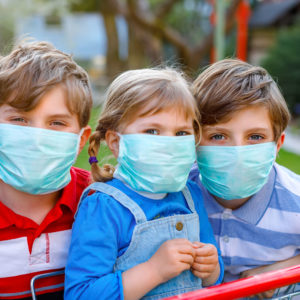School officials say the kids are just fine.
Parents and community members in New Hampshire have been worrying themselves sick as the academic year begins, asking questions about whether small children can wear masks and if elementary school students should spend hours on Zoom.
“I think a lot of people think kindergarteners and first graders can’t wear masks. They can wear masks,” Rochester Superintendent Kyle Repucci said of students who are going to school in-person at the city’s schools.
Repucci said for those students who are enrolled in remote learning, breaks are built into the school curriculum.
“We do know it is important to take breaks from screen time,” Repucci said.
Repucci said that even though a case of COVID-19 was discovered at Spaulding High School last week, none of Rochester’s 1,800 students in kindergarten through fifth grade were affected.
The high school in Rochester is shut down this week, joining the list of schools which have opened and then closed due to the novel coronavirus this fall semester.
Barrington Elementary School was closed for the week of Sept. 14 due to two cases discovered there. As of Tuesday, officials from the New Hampshire Department of Health and Human Services were monitoring one active and three recovered cases at the school.
Barrington Superintendent Daniel Moulis said on Tuesday that his elementary school students are happy to be back in the building.
“The students have done a wonderful job, just a really great job, adhering to the new school protocols we have,” Moulis said.
Moulis said in addition to face masks and social distancing, being flexible about moving between in-person and remote learning as COVID-19 cases occur is important for students and staff as the academic year moves forward.
“Having those different plans in place is really important so if we need to transition, we can do so smoothly,” Moulis said.
Moulis said school officials are also conscious that people are concerned about the social and emotional effects of a radically different school environment on children. That is why giving students mask breaks and time to play outside are heavily emphasized at the elementary school, where there are approximately 400 students.
In Manchester, the only students back in a classroom are in special education, kindergarten and first grade.
The kindergarten and first grade students are in a hybrid learning model where they attend classes in-person two days a week.
Andrew Toland is the communications director for the Manchester School District. He said on Tuesday that they hope that by the end of the week they can start moving forward with plans to expand hybrid learning in grades 2 to 12.
The same is unlikely in Nashua, where special education, kindergarten and first-graders won’t even begin hybrid schooling until October and other grades will have to wait until at least November for in-person instruction.
During his weekly press briefing last week, Gov. Chris Sununu said that officials in school districts that had chosen to go totally remote are seeing that it can be done successfully.
“Because it has gone so well, I think that’s put a little bit, I don’t want to say, pressure, but I think that’s really allowed some of these districts that had chose to go fully remote to understand that it can be done successfully,” Sununu said.
Sununu said that doesn’t mean schools won’t see cases of COVID-19 this academic year, calling that idea “unrealistic.”
“We are detecting a few more of individuals of the younger spectrum, if you will, that are testing positive. That doesn’t necessarily mean that they’re sick, I just want to be clear about that, but they are testing positive,” Sununu said.
Sununu said in districts where cases have been discovered, schools have been shut down, cleaned and then reopened.
“Which is the exact right thing to do,” Sununu said.
When all public schools shut down in March, experts from the University of New Hampshire offered tips to help parents better cope with virtual learning, which can be stressful and is still a part of many school weeks for Granite State children.
Andrew Coppens, assistant professor of education and an expert in learning sciences, said children are often already skilled in more than one way of learning.
“This can be good news because it opens the door for combining different types of learning when educating young children, including online, remote and in-person,” Coppens said.
Coppens, along with his colleagues Associate Professor Alecia Magnifico and Bethany Silva, director of the Community Literacy Center at UNH, said there are steps families can take at home to help their students succeed.
They include:
— Maintain a routine to help children thrive.
— Take breaks.
— Go for a walk, try a YouTube yoga class or have a house dance party.
— Supplement curriculum with extra activities to enhance learning, such as journaling or reading stories.
As of Tuesday, officials at NH DHHS were monitoring active cases at five elementary schools, including Barrington. The others were Golden Brook Elementary School in Windham, Griffin Memorial School in Litchfield, Nottingham Elementary School and Penacook Elementary School.

